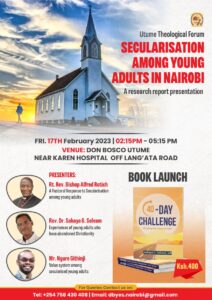 African scholars have claimed that African peoples are “notoriously religious”. Is this still the case? Empirical literature on the subject is meagre. Therefore, the objective of this study was to examine the antecedents, triggers and response of secularisation and spirituality among lapsed-Christian young adults in Nairobi, Kenya, the participants were aged between 18 and 35, who were baptised but have abandoned Christian faith in favour of secularisation or non-affiliated spirituality. Qualitative data, from semi-structured in-depth interviews among the 14 participants, sampled through a snowball process, was recorded, transcribed verbatim, and analysed by the two authors. Eleven emerging themes were identified from 10 hours of data. The first two themes suggest that mixed faith backgrounds of parents and discordant relationship within the family act as antecedents in adopting a secular perspective. The next two themes relate to the role of Christianity itself in terms of lack of faith formation and exaggeration of religiosity. The fifth and sixth themes revolve around trauma in Africa/Kenya, historical and contemporary. There were two themes pertaining to ill-treatment meted out by Christianity. The rest of the themes relate to how these individuals maintain meaning, value and spiritual systems. The findings are likely to generate an evidence-based discussion among religious leaders in Africa/Kenya.
African scholars have claimed that African peoples are “notoriously religious”. Is this still the case? Empirical literature on the subject is meagre. Therefore, the objective of this study was to examine the antecedents, triggers and response of secularisation and spirituality among lapsed-Christian young adults in Nairobi, Kenya, the participants were aged between 18 and 35, who were baptised but have abandoned Christian faith in favour of secularisation or non-affiliated spirituality. Qualitative data, from semi-structured in-depth interviews among the 14 participants, sampled through a snowball process, was recorded, transcribed verbatim, and analysed by the two authors. Eleven emerging themes were identified from 10 hours of data. The first two themes suggest that mixed faith backgrounds of parents and discordant relationship within the family act as antecedents in adopting a secular perspective. The next two themes relate to the role of Christianity itself in terms of lack of faith formation and exaggeration of religiosity. The fifth and sixth themes revolve around trauma in Africa/Kenya, historical and contemporary. There were two themes pertaining to ill-treatment meted out by Christianity. The rest of the themes relate to how these individuals maintain meaning, value and spiritual systems. The findings are likely to generate an evidence-based discussion among religious leaders in Africa/Kenya.